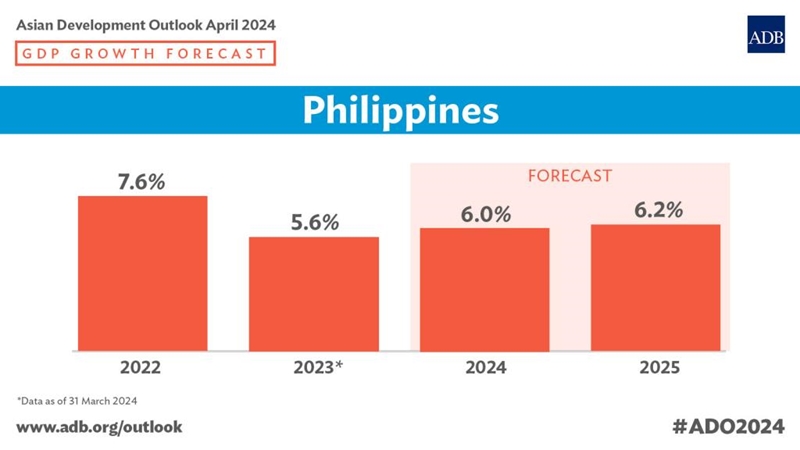Easing inflation, domestic demand to support faster Philippine growth
Saturday, 13/04/2024 11:21 (GMT+7)
(CPV) - The Philippine economy is expected to post faster growth this year and the next on the back of slowing inflation, stronger and broad-based domestic demand, and higher public investment, according to a new report released by the Asian Development Bank (ADB) on April 11th 2024.
ADB’s flagship economic publication Asian Development Outlook (ADO) April 2024 forecasts Philippine economic growth at 6.0% this year, further picking up pace at 6.2% in 2025 following an expected easing of monetary policy after a series of rate hikes from 2022 until October 2023. The Philippines will continue to be among the fastest growing economies in Southeast Asia this year and the next, based on the report.
However, severe weather events such as a prolonged El Niño dry weather episode and possible strong typhoons later in the year due to the La Niña phenomenon could result in inflation pressures. A sharper slowdown in major advanced economies, heightened geopolitical tensions, and higher-than-expected global commodity prices could also weigh on growth, the report said.
 |
| Source: ADB |
“The Philippines’ growth momentum is picking up speed, driven by the government’s efforts to improve budget execution, mobilize additional revenue, and pursue reforms to boost the investment climate. Investments on large public infrastructure projects, as well as much needed social services, will boost government expenditures and bode well for the economy in the long run,” said ADB Philippines Country Director Pavit Ramachandran.
The government is pursuing major investments under its “Build Better More” infrastructure development program. Under the program, 67 flagship projects are currently underway, with 30 more projects approved as of March 2024. The program includes bridges, expressways, ports, and railways, among others. Some of these projects are funded by ADB, such as the Malolos Clark Railway Project and the South Commuter Railway Project which will link Metro Manila to northern and southern provinces in the Luzon region.
A low unemployment rate at 4.5% in January 2024, below the country’s pre-pandemic average, continues to support household spending. Strong retail trade, higher tourist arrivals and receipts, and an expansion in business services will sustain growth in the services sector, which account for over half of gross domestic product and employment, the report said.
Inflation is expected to moderate to 3.8% in 2024 and 3.4% in 2025, falling within the 2% to 4% target range of the Bangko Sentral ng Pilipinas. Decelerating global oil prices and an extension in reduced tariffs on major food items, including rice, corn, and pork, until December 2024 will help contain food inflation, according to the report.
Promoting higher levels of private sector participation in the economy will be vital to further raise growth and productivity, the report said. An enhanced public–private partnership (PPP) regulatory framework with the signing last month of the PPP Code of the Philippines Act Implementing Rules and Regulations will help further mobilize private investment for infrastructure development, including for green and resilient energy and telecommunications./.
Khac Kien